Analysis of Fodare Pyt Ltd. V Shearn [2011] NSWSC 479 Case
VerifiedAdded on 2021/06/15
|8
|2421
|15
Report
AI Summary
This report provides a comprehensive analysis of the Fodare Pyt Ltd. v Shearn [2011] NSWSC 479 case, focusing on the breaches of director's duties under the Corporations Act 2001. The case involves Ms. Shearn, the sole director, who diverted company funds for personal use, leading to the company's winding up. The report examines the specific duties breached, including the duty to act in good faith and exercise reasonable care, and analyzes the court's decision, which held Shearn liable for compensation. The impact of the decision on the operation of companies in Australia is also discussed, highlighting the importance of director responsibilities and the significance of the Corporations Act in safeguarding company interests. The report also explores the implications of the case on the management of companies, particularly when a sole director is involved and the importance of having a will.
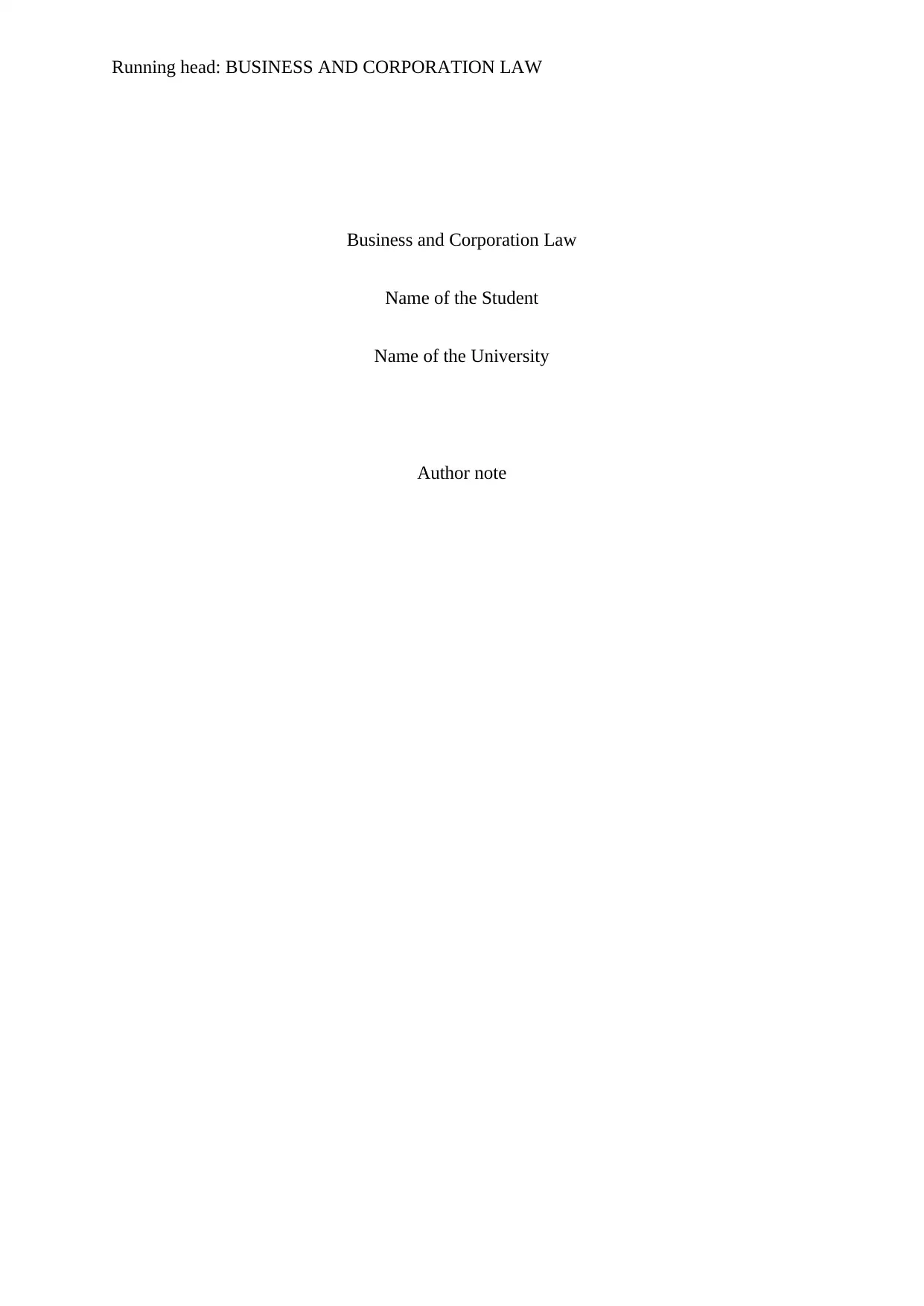
Running head: BUSINESS AND CORPORATION LAW
Business and Corporation Law
Name of the Student
Name of the University
Author note
Business and Corporation Law
Name of the Student
Name of the University
Author note
Paraphrase This Document
Need a fresh take? Get an instant paraphrase of this document with our AI Paraphraser
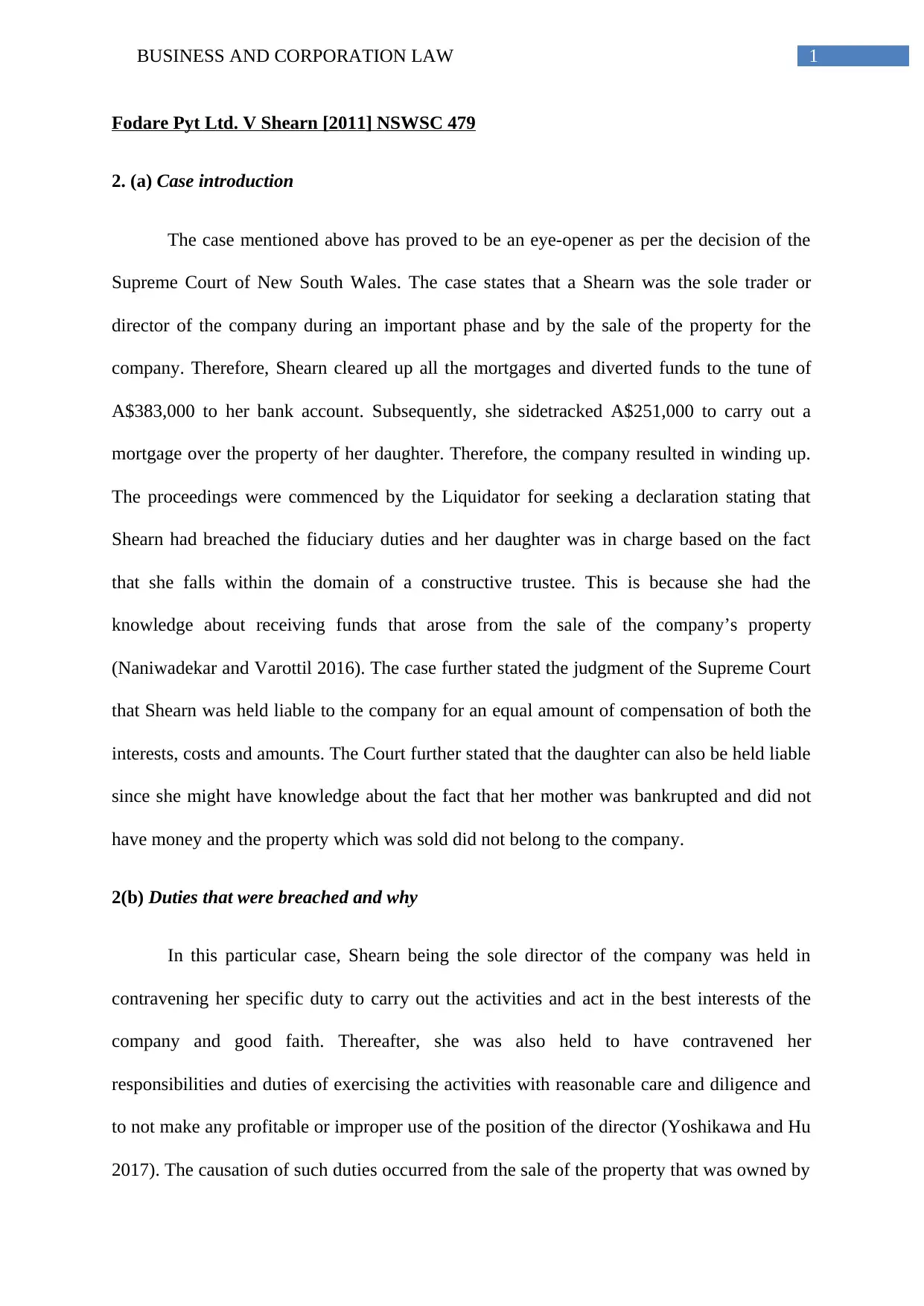
1BUSINESS AND CORPORATION LAW
Fodare Pyt Ltd. V Shearn [2011] NSWSC 479
2. (a) Case introduction
The case mentioned above has proved to be an eye-opener as per the decision of the
Supreme Court of New South Wales. The case states that a Shearn was the sole trader or
director of the company during an important phase and by the sale of the property for the
company. Therefore, Shearn cleared up all the mortgages and diverted funds to the tune of
A$383,000 to her bank account. Subsequently, she sidetracked A$251,000 to carry out a
mortgage over the property of her daughter. Therefore, the company resulted in winding up.
The proceedings were commenced by the Liquidator for seeking a declaration stating that
Shearn had breached the fiduciary duties and her daughter was in charge based on the fact
that she falls within the domain of a constructive trustee. This is because she had the
knowledge about receiving funds that arose from the sale of the company’s property
(Naniwadekar and Varottil 2016). The case further stated the judgment of the Supreme Court
that Shearn was held liable to the company for an equal amount of compensation of both the
interests, costs and amounts. The Court further stated that the daughter can also be held liable
since she might have knowledge about the fact that her mother was bankrupted and did not
have money and the property which was sold did not belong to the company.
2(b) Duties that were breached and why
In this particular case, Shearn being the sole director of the company was held in
contravening her specific duty to carry out the activities and act in the best interests of the
company and good faith. Thereafter, she was also held to have contravened her
responsibilities and duties of exercising the activities with reasonable care and diligence and
to not make any profitable or improper use of the position of the director (Yoshikawa and Hu
2017). The causation of such duties occurred from the sale of the property that was owned by
Fodare Pyt Ltd. V Shearn [2011] NSWSC 479
2. (a) Case introduction
The case mentioned above has proved to be an eye-opener as per the decision of the
Supreme Court of New South Wales. The case states that a Shearn was the sole trader or
director of the company during an important phase and by the sale of the property for the
company. Therefore, Shearn cleared up all the mortgages and diverted funds to the tune of
A$383,000 to her bank account. Subsequently, she sidetracked A$251,000 to carry out a
mortgage over the property of her daughter. Therefore, the company resulted in winding up.
The proceedings were commenced by the Liquidator for seeking a declaration stating that
Shearn had breached the fiduciary duties and her daughter was in charge based on the fact
that she falls within the domain of a constructive trustee. This is because she had the
knowledge about receiving funds that arose from the sale of the company’s property
(Naniwadekar and Varottil 2016). The case further stated the judgment of the Supreme Court
that Shearn was held liable to the company for an equal amount of compensation of both the
interests, costs and amounts. The Court further stated that the daughter can also be held liable
since she might have knowledge about the fact that her mother was bankrupted and did not
have money and the property which was sold did not belong to the company.
2(b) Duties that were breached and why
In this particular case, Shearn being the sole director of the company was held in
contravening her specific duty to carry out the activities and act in the best interests of the
company and good faith. Thereafter, she was also held to have contravened her
responsibilities and duties of exercising the activities with reasonable care and diligence and
to not make any profitable or improper use of the position of the director (Yoshikawa and Hu
2017). The causation of such duties occurred from the sale of the property that was owned by
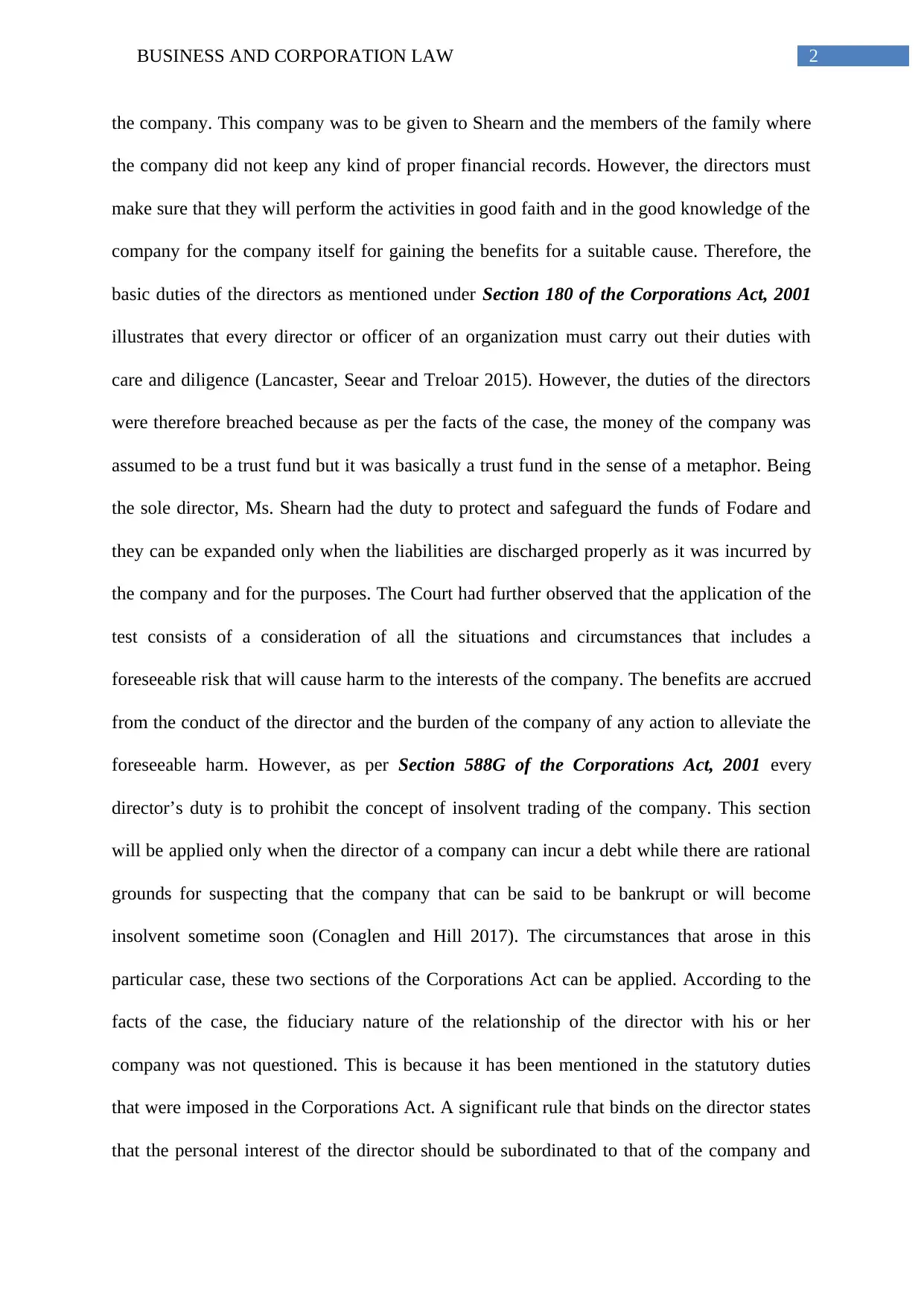
2BUSINESS AND CORPORATION LAW
the company. This company was to be given to Shearn and the members of the family where
the company did not keep any kind of proper financial records. However, the directors must
make sure that they will perform the activities in good faith and in the good knowledge of the
company for the company itself for gaining the benefits for a suitable cause. Therefore, the
basic duties of the directors as mentioned under Section 180 of the Corporations Act, 2001
illustrates that every director or officer of an organization must carry out their duties with
care and diligence (Lancaster, Seear and Treloar 2015). However, the duties of the directors
were therefore breached because as per the facts of the case, the money of the company was
assumed to be a trust fund but it was basically a trust fund in the sense of a metaphor. Being
the sole director, Ms. Shearn had the duty to protect and safeguard the funds of Fodare and
they can be expanded only when the liabilities are discharged properly as it was incurred by
the company and for the purposes. The Court had further observed that the application of the
test consists of a consideration of all the situations and circumstances that includes a
foreseeable risk that will cause harm to the interests of the company. The benefits are accrued
from the conduct of the director and the burden of the company of any action to alleviate the
foreseeable harm. However, as per Section 588G of the Corporations Act, 2001 every
director’s duty is to prohibit the concept of insolvent trading of the company. This section
will be applied only when the director of a company can incur a debt while there are rational
grounds for suspecting that the company that can be said to be bankrupt or will become
insolvent sometime soon (Conaglen and Hill 2017). The circumstances that arose in this
particular case, these two sections of the Corporations Act can be applied. According to the
facts of the case, the fiduciary nature of the relationship of the director with his or her
company was not questioned. This is because it has been mentioned in the statutory duties
that were imposed in the Corporations Act. A significant rule that binds on the director states
that the personal interest of the director should be subordinated to that of the company and
the company. This company was to be given to Shearn and the members of the family where
the company did not keep any kind of proper financial records. However, the directors must
make sure that they will perform the activities in good faith and in the good knowledge of the
company for the company itself for gaining the benefits for a suitable cause. Therefore, the
basic duties of the directors as mentioned under Section 180 of the Corporations Act, 2001
illustrates that every director or officer of an organization must carry out their duties with
care and diligence (Lancaster, Seear and Treloar 2015). However, the duties of the directors
were therefore breached because as per the facts of the case, the money of the company was
assumed to be a trust fund but it was basically a trust fund in the sense of a metaphor. Being
the sole director, Ms. Shearn had the duty to protect and safeguard the funds of Fodare and
they can be expanded only when the liabilities are discharged properly as it was incurred by
the company and for the purposes. The Court had further observed that the application of the
test consists of a consideration of all the situations and circumstances that includes a
foreseeable risk that will cause harm to the interests of the company. The benefits are accrued
from the conduct of the director and the burden of the company of any action to alleviate the
foreseeable harm. However, as per Section 588G of the Corporations Act, 2001 every
director’s duty is to prohibit the concept of insolvent trading of the company. This section
will be applied only when the director of a company can incur a debt while there are rational
grounds for suspecting that the company that can be said to be bankrupt or will become
insolvent sometime soon (Conaglen and Hill 2017). The circumstances that arose in this
particular case, these two sections of the Corporations Act can be applied. According to the
facts of the case, the fiduciary nature of the relationship of the director with his or her
company was not questioned. This is because it has been mentioned in the statutory duties
that were imposed in the Corporations Act. A significant rule that binds on the director states
that the personal interest of the director should be subordinated to that of the company and
⊘ This is a preview!⊘
Do you want full access?
Subscribe today to unlock all pages.

Trusted by 1+ million students worldwide
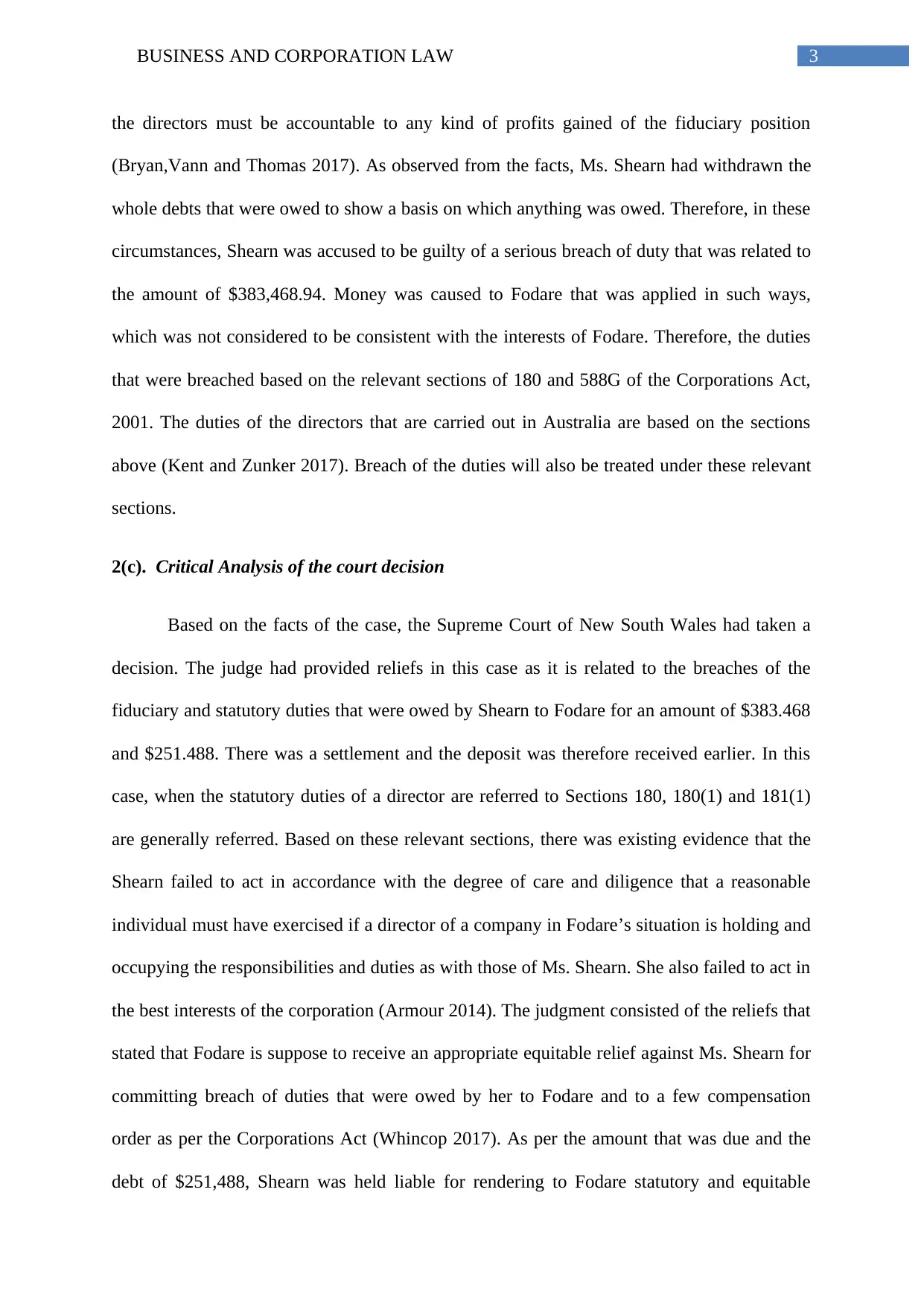
3BUSINESS AND CORPORATION LAW
the directors must be accountable to any kind of profits gained of the fiduciary position
(Bryan,Vann and Thomas 2017). As observed from the facts, Ms. Shearn had withdrawn the
whole debts that were owed to show a basis on which anything was owed. Therefore, in these
circumstances, Shearn was accused to be guilty of a serious breach of duty that was related to
the amount of $383,468.94. Money was caused to Fodare that was applied in such ways,
which was not considered to be consistent with the interests of Fodare. Therefore, the duties
that were breached based on the relevant sections of 180 and 588G of the Corporations Act,
2001. The duties of the directors that are carried out in Australia are based on the sections
above (Kent and Zunker 2017). Breach of the duties will also be treated under these relevant
sections.
2(c). Critical Analysis of the court decision
Based on the facts of the case, the Supreme Court of New South Wales had taken a
decision. The judge had provided reliefs in this case as it is related to the breaches of the
fiduciary and statutory duties that were owed by Shearn to Fodare for an amount of $383.468
and $251.488. There was a settlement and the deposit was therefore received earlier. In this
case, when the statutory duties of a director are referred to Sections 180, 180(1) and 181(1)
are generally referred. Based on these relevant sections, there was existing evidence that the
Shearn failed to act in accordance with the degree of care and diligence that a reasonable
individual must have exercised if a director of a company in Fodare’s situation is holding and
occupying the responsibilities and duties as with those of Ms. Shearn. She also failed to act in
the best interests of the corporation (Armour 2014). The judgment consisted of the reliefs that
stated that Fodare is suppose to receive an appropriate equitable relief against Ms. Shearn for
committing breach of duties that were owed by her to Fodare and to a few compensation
order as per the Corporations Act (Whincop 2017). As per the amount that was due and the
debt of $251,488, Shearn was held liable for rendering to Fodare statutory and equitable
the directors must be accountable to any kind of profits gained of the fiduciary position
(Bryan,Vann and Thomas 2017). As observed from the facts, Ms. Shearn had withdrawn the
whole debts that were owed to show a basis on which anything was owed. Therefore, in these
circumstances, Shearn was accused to be guilty of a serious breach of duty that was related to
the amount of $383,468.94. Money was caused to Fodare that was applied in such ways,
which was not considered to be consistent with the interests of Fodare. Therefore, the duties
that were breached based on the relevant sections of 180 and 588G of the Corporations Act,
2001. The duties of the directors that are carried out in Australia are based on the sections
above (Kent and Zunker 2017). Breach of the duties will also be treated under these relevant
sections.
2(c). Critical Analysis of the court decision
Based on the facts of the case, the Supreme Court of New South Wales had taken a
decision. The judge had provided reliefs in this case as it is related to the breaches of the
fiduciary and statutory duties that were owed by Shearn to Fodare for an amount of $383.468
and $251.488. There was a settlement and the deposit was therefore received earlier. In this
case, when the statutory duties of a director are referred to Sections 180, 180(1) and 181(1)
are generally referred. Based on these relevant sections, there was existing evidence that the
Shearn failed to act in accordance with the degree of care and diligence that a reasonable
individual must have exercised if a director of a company in Fodare’s situation is holding and
occupying the responsibilities and duties as with those of Ms. Shearn. She also failed to act in
the best interests of the corporation (Armour 2014). The judgment consisted of the reliefs that
stated that Fodare is suppose to receive an appropriate equitable relief against Ms. Shearn for
committing breach of duties that were owed by her to Fodare and to a few compensation
order as per the Corporations Act (Whincop 2017). As per the amount that was due and the
debt of $251,488, Shearn was held liable for rendering to Fodare statutory and equitable
Paraphrase This Document
Need a fresh take? Get an instant paraphrase of this document with our AI Paraphraser
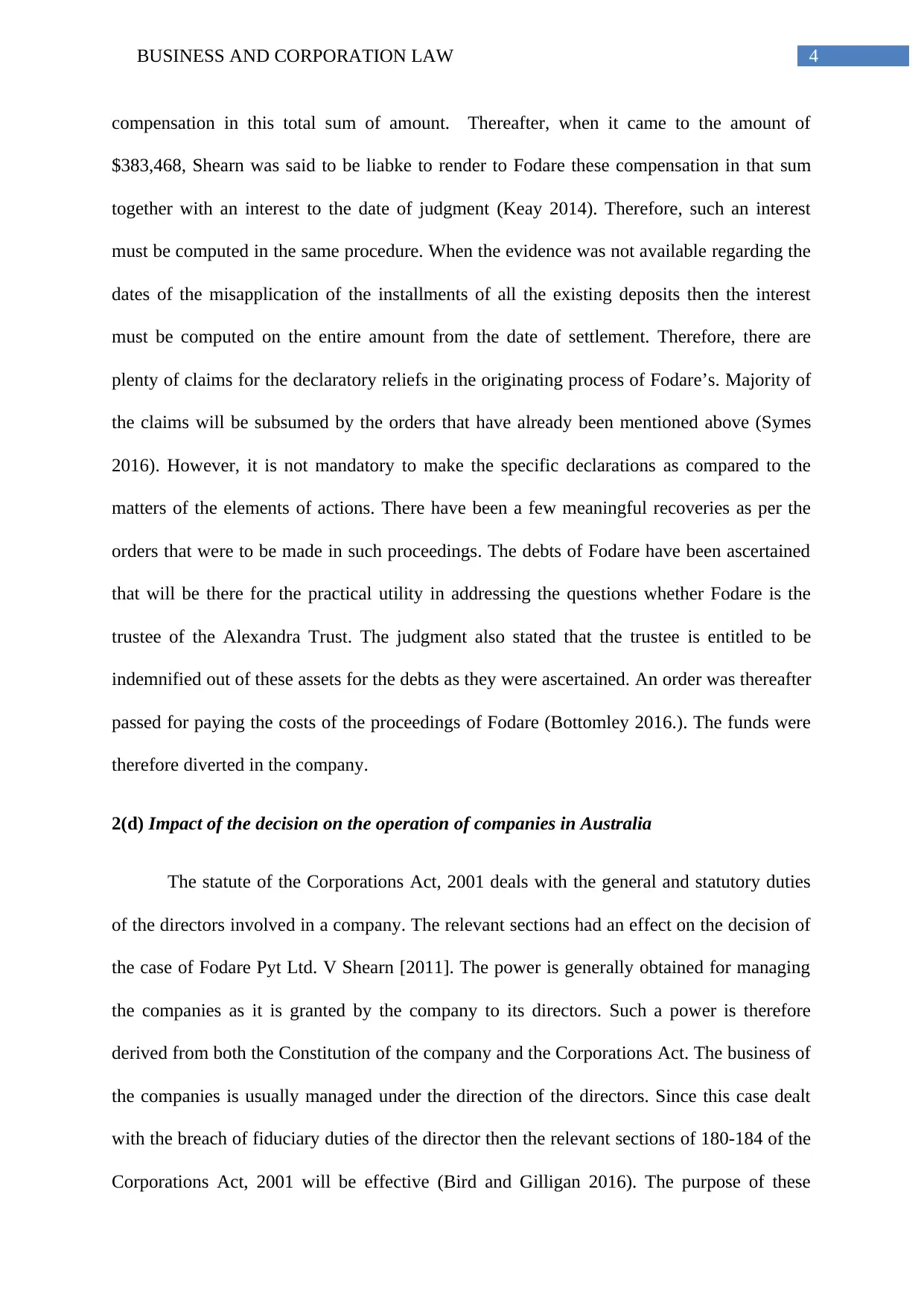
4BUSINESS AND CORPORATION LAW
compensation in this total sum of amount. Thereafter, when it came to the amount of
$383,468, Shearn was said to be liabke to render to Fodare these compensation in that sum
together with an interest to the date of judgment (Keay 2014). Therefore, such an interest
must be computed in the same procedure. When the evidence was not available regarding the
dates of the misapplication of the installments of all the existing deposits then the interest
must be computed on the entire amount from the date of settlement. Therefore, there are
plenty of claims for the declaratory reliefs in the originating process of Fodare’s. Majority of
the claims will be subsumed by the orders that have already been mentioned above (Symes
2016). However, it is not mandatory to make the specific declarations as compared to the
matters of the elements of actions. There have been a few meaningful recoveries as per the
orders that were to be made in such proceedings. The debts of Fodare have been ascertained
that will be there for the practical utility in addressing the questions whether Fodare is the
trustee of the Alexandra Trust. The judgment also stated that the trustee is entitled to be
indemnified out of these assets for the debts as they were ascertained. An order was thereafter
passed for paying the costs of the proceedings of Fodare (Bottomley 2016.). The funds were
therefore diverted in the company.
2(d) Impact of the decision on the operation of companies in Australia
The statute of the Corporations Act, 2001 deals with the general and statutory duties
of the directors involved in a company. The relevant sections had an effect on the decision of
the case of Fodare Pyt Ltd. V Shearn [2011]. The power is generally obtained for managing
the companies as it is granted by the company to its directors. Such a power is therefore
derived from both the Constitution of the company and the Corporations Act. The business of
the companies is usually managed under the direction of the directors. Since this case dealt
with the breach of fiduciary duties of the director then the relevant sections of 180-184 of the
Corporations Act, 2001 will be effective (Bird and Gilligan 2016). The purpose of these
compensation in this total sum of amount. Thereafter, when it came to the amount of
$383,468, Shearn was said to be liabke to render to Fodare these compensation in that sum
together with an interest to the date of judgment (Keay 2014). Therefore, such an interest
must be computed in the same procedure. When the evidence was not available regarding the
dates of the misapplication of the installments of all the existing deposits then the interest
must be computed on the entire amount from the date of settlement. Therefore, there are
plenty of claims for the declaratory reliefs in the originating process of Fodare’s. Majority of
the claims will be subsumed by the orders that have already been mentioned above (Symes
2016). However, it is not mandatory to make the specific declarations as compared to the
matters of the elements of actions. There have been a few meaningful recoveries as per the
orders that were to be made in such proceedings. The debts of Fodare have been ascertained
that will be there for the practical utility in addressing the questions whether Fodare is the
trustee of the Alexandra Trust. The judgment also stated that the trustee is entitled to be
indemnified out of these assets for the debts as they were ascertained. An order was thereafter
passed for paying the costs of the proceedings of Fodare (Bottomley 2016.). The funds were
therefore diverted in the company.
2(d) Impact of the decision on the operation of companies in Australia
The statute of the Corporations Act, 2001 deals with the general and statutory duties
of the directors involved in a company. The relevant sections had an effect on the decision of
the case of Fodare Pyt Ltd. V Shearn [2011]. The power is generally obtained for managing
the companies as it is granted by the company to its directors. Such a power is therefore
derived from both the Constitution of the company and the Corporations Act. The business of
the companies is usually managed under the direction of the directors. Since this case dealt
with the breach of fiduciary duties of the director then the relevant sections of 180-184 of the
Corporations Act, 2001 will be effective (Bird and Gilligan 2016). The purpose of these
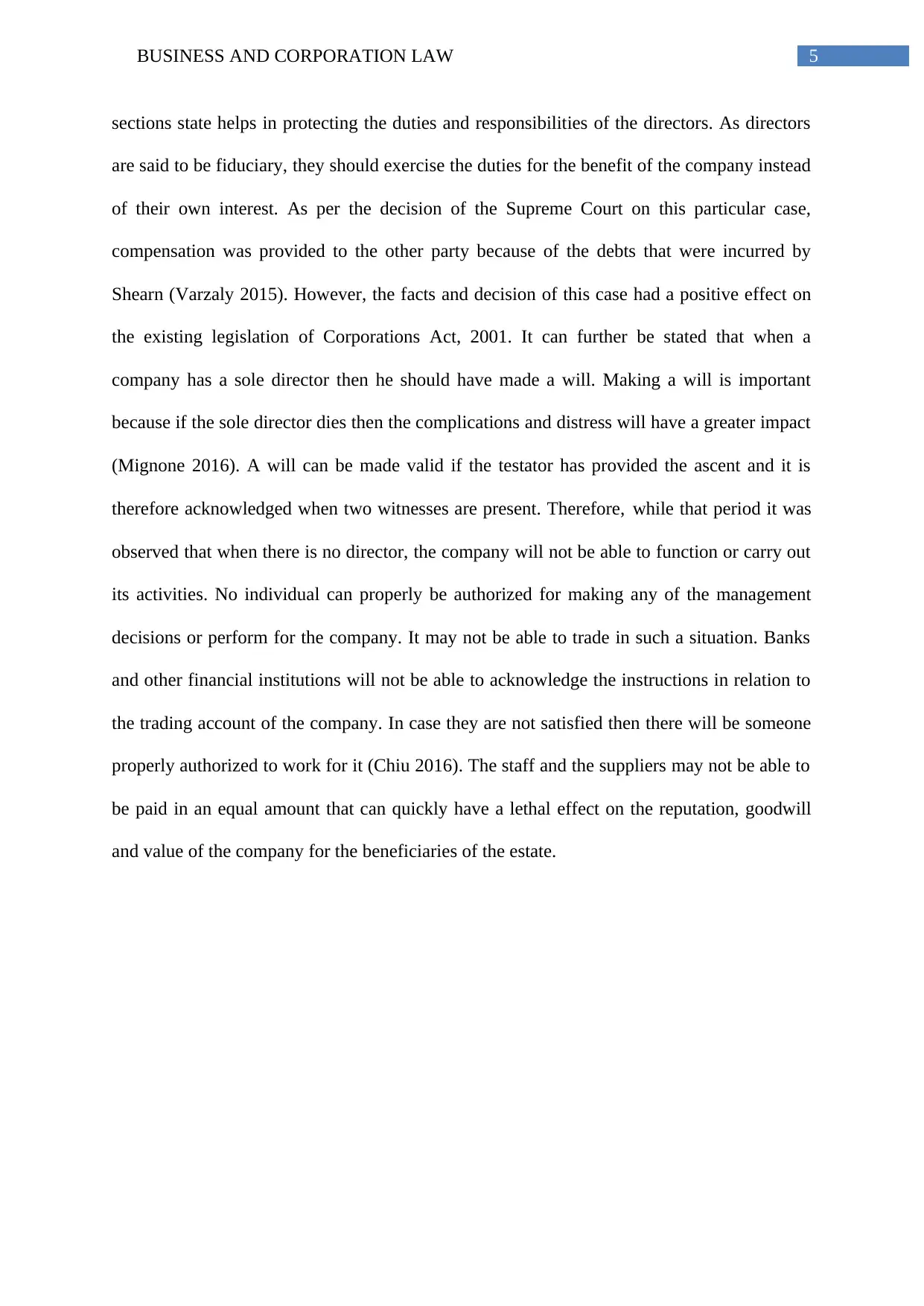
5BUSINESS AND CORPORATION LAW
sections state helps in protecting the duties and responsibilities of the directors. As directors
are said to be fiduciary, they should exercise the duties for the benefit of the company instead
of their own interest. As per the decision of the Supreme Court on this particular case,
compensation was provided to the other party because of the debts that were incurred by
Shearn (Varzaly 2015). However, the facts and decision of this case had a positive effect on
the existing legislation of Corporations Act, 2001. It can further be stated that when a
company has a sole director then he should have made a will. Making a will is important
because if the sole director dies then the complications and distress will have a greater impact
(Mignone 2016). A will can be made valid if the testator has provided the ascent and it is
therefore acknowledged when two witnesses are present. Therefore, while that period it was
observed that when there is no director, the company will not be able to function or carry out
its activities. No individual can properly be authorized for making any of the management
decisions or perform for the company. It may not be able to trade in such a situation. Banks
and other financial institutions will not be able to acknowledge the instructions in relation to
the trading account of the company. In case they are not satisfied then there will be someone
properly authorized to work for it (Chiu 2016). The staff and the suppliers may not be able to
be paid in an equal amount that can quickly have a lethal effect on the reputation, goodwill
and value of the company for the beneficiaries of the estate.
sections state helps in protecting the duties and responsibilities of the directors. As directors
are said to be fiduciary, they should exercise the duties for the benefit of the company instead
of their own interest. As per the decision of the Supreme Court on this particular case,
compensation was provided to the other party because of the debts that were incurred by
Shearn (Varzaly 2015). However, the facts and decision of this case had a positive effect on
the existing legislation of Corporations Act, 2001. It can further be stated that when a
company has a sole director then he should have made a will. Making a will is important
because if the sole director dies then the complications and distress will have a greater impact
(Mignone 2016). A will can be made valid if the testator has provided the ascent and it is
therefore acknowledged when two witnesses are present. Therefore, while that period it was
observed that when there is no director, the company will not be able to function or carry out
its activities. No individual can properly be authorized for making any of the management
decisions or perform for the company. It may not be able to trade in such a situation. Banks
and other financial institutions will not be able to acknowledge the instructions in relation to
the trading account of the company. In case they are not satisfied then there will be someone
properly authorized to work for it (Chiu 2016). The staff and the suppliers may not be able to
be paid in an equal amount that can quickly have a lethal effect on the reputation, goodwill
and value of the company for the beneficiaries of the estate.
⊘ This is a preview!⊘
Do you want full access?
Subscribe today to unlock all pages.

Trusted by 1+ million students worldwide
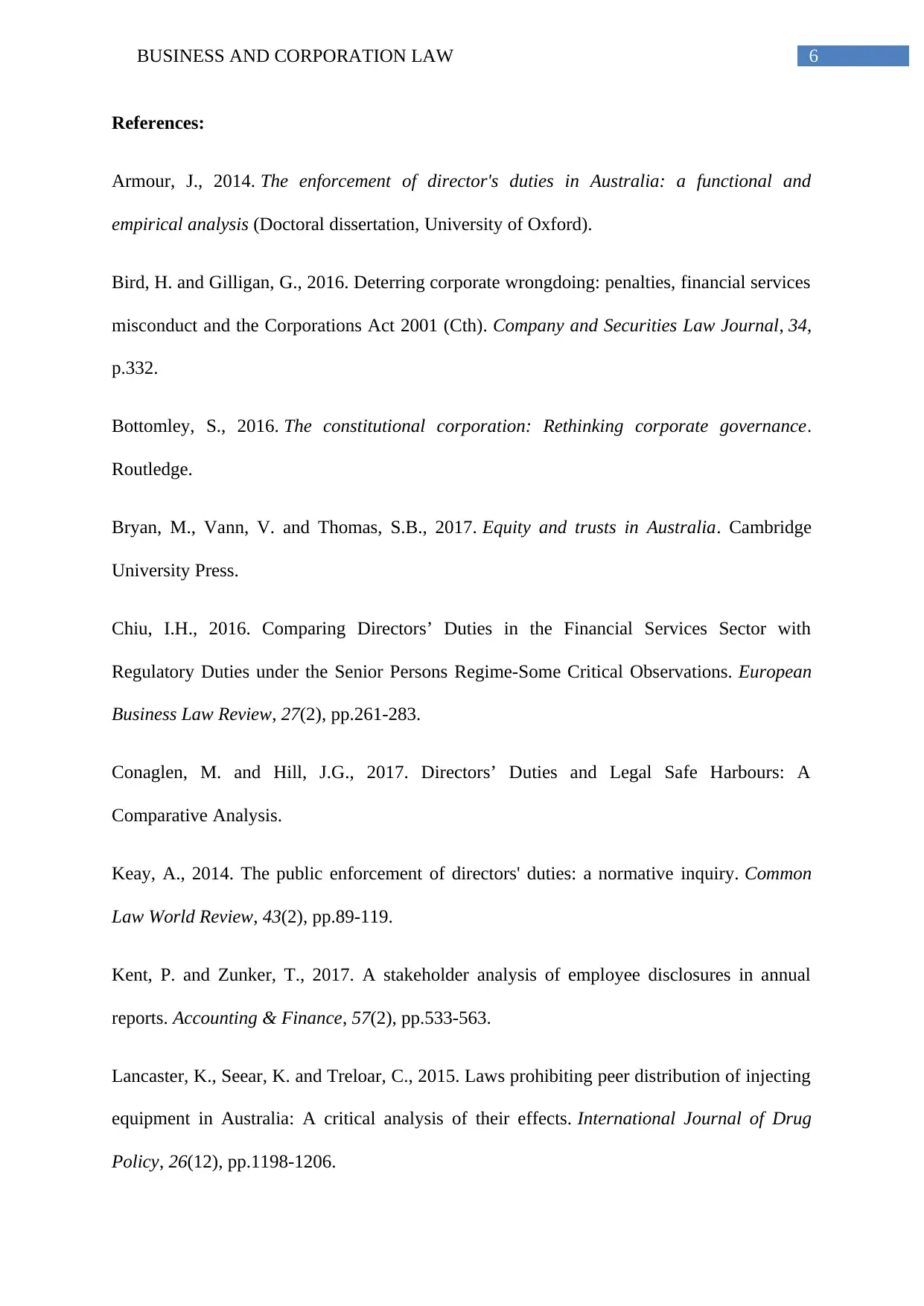
6BUSINESS AND CORPORATION LAW
References:
Armour, J., 2014. The enforcement of director's duties in Australia: a functional and
empirical analysis (Doctoral dissertation, University of Oxford).
Bird, H. and Gilligan, G., 2016. Deterring corporate wrongdoing: penalties, financial services
misconduct and the Corporations Act 2001 (Cth). Company and Securities Law Journal, 34,
p.332.
Bottomley, S., 2016. The constitutional corporation: Rethinking corporate governance.
Routledge.
Bryan, M., Vann, V. and Thomas, S.B., 2017. Equity and trusts in Australia. Cambridge
University Press.
Chiu, I.H., 2016. Comparing Directors’ Duties in the Financial Services Sector with
Regulatory Duties under the Senior Persons Regime-Some Critical Observations. European
Business Law Review, 27(2), pp.261-283.
Conaglen, M. and Hill, J.G., 2017. Directors’ Duties and Legal Safe Harbours: A
Comparative Analysis.
Keay, A., 2014. The public enforcement of directors' duties: a normative inquiry. Common
Law World Review, 43(2), pp.89-119.
Kent, P. and Zunker, T., 2017. A stakeholder analysis of employee disclosures in annual
reports. Accounting & Finance, 57(2), pp.533-563.
Lancaster, K., Seear, K. and Treloar, C., 2015. Laws prohibiting peer distribution of injecting
equipment in Australia: A critical analysis of their effects. International Journal of Drug
Policy, 26(12), pp.1198-1206.
References:
Armour, J., 2014. The enforcement of director's duties in Australia: a functional and
empirical analysis (Doctoral dissertation, University of Oxford).
Bird, H. and Gilligan, G., 2016. Deterring corporate wrongdoing: penalties, financial services
misconduct and the Corporations Act 2001 (Cth). Company and Securities Law Journal, 34,
p.332.
Bottomley, S., 2016. The constitutional corporation: Rethinking corporate governance.
Routledge.
Bryan, M., Vann, V. and Thomas, S.B., 2017. Equity and trusts in Australia. Cambridge
University Press.
Chiu, I.H., 2016. Comparing Directors’ Duties in the Financial Services Sector with
Regulatory Duties under the Senior Persons Regime-Some Critical Observations. European
Business Law Review, 27(2), pp.261-283.
Conaglen, M. and Hill, J.G., 2017. Directors’ Duties and Legal Safe Harbours: A
Comparative Analysis.
Keay, A., 2014. The public enforcement of directors' duties: a normative inquiry. Common
Law World Review, 43(2), pp.89-119.
Kent, P. and Zunker, T., 2017. A stakeholder analysis of employee disclosures in annual
reports. Accounting & Finance, 57(2), pp.533-563.
Lancaster, K., Seear, K. and Treloar, C., 2015. Laws prohibiting peer distribution of injecting
equipment in Australia: A critical analysis of their effects. International Journal of Drug
Policy, 26(12), pp.1198-1206.
Paraphrase This Document
Need a fresh take? Get an instant paraphrase of this document with our AI Paraphraser
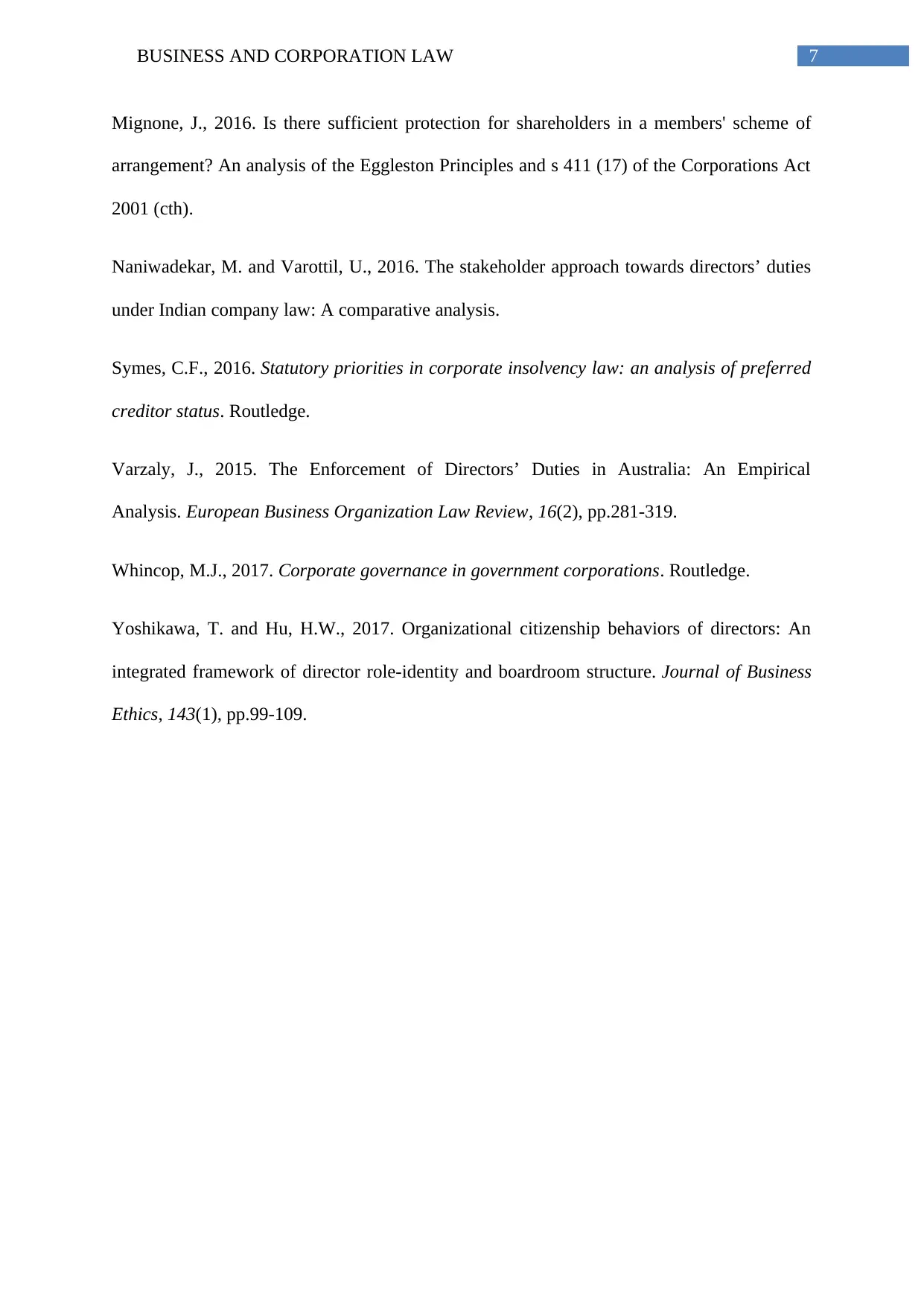
7BUSINESS AND CORPORATION LAW
Mignone, J., 2016. Is there sufficient protection for shareholders in a members' scheme of
arrangement? An analysis of the Eggleston Principles and s 411 (17) of the Corporations Act
2001 (cth).
Naniwadekar, M. and Varottil, U., 2016. The stakeholder approach towards directors’ duties
under Indian company law: A comparative analysis.
Symes, C.F., 2016. Statutory priorities in corporate insolvency law: an analysis of preferred
creditor status. Routledge.
Varzaly, J., 2015. The Enforcement of Directors’ Duties in Australia: An Empirical
Analysis. European Business Organization Law Review, 16(2), pp.281-319.
Whincop, M.J., 2017. Corporate governance in government corporations. Routledge.
Yoshikawa, T. and Hu, H.W., 2017. Organizational citizenship behaviors of directors: An
integrated framework of director role-identity and boardroom structure. Journal of Business
Ethics, 143(1), pp.99-109.
Mignone, J., 2016. Is there sufficient protection for shareholders in a members' scheme of
arrangement? An analysis of the Eggleston Principles and s 411 (17) of the Corporations Act
2001 (cth).
Naniwadekar, M. and Varottil, U., 2016. The stakeholder approach towards directors’ duties
under Indian company law: A comparative analysis.
Symes, C.F., 2016. Statutory priorities in corporate insolvency law: an analysis of preferred
creditor status. Routledge.
Varzaly, J., 2015. The Enforcement of Directors’ Duties in Australia: An Empirical
Analysis. European Business Organization Law Review, 16(2), pp.281-319.
Whincop, M.J., 2017. Corporate governance in government corporations. Routledge.
Yoshikawa, T. and Hu, H.W., 2017. Organizational citizenship behaviors of directors: An
integrated framework of director role-identity and boardroom structure. Journal of Business
Ethics, 143(1), pp.99-109.
1 out of 8
Related Documents
Your All-in-One AI-Powered Toolkit for Academic Success.
+13062052269
info@desklib.com
Available 24*7 on WhatsApp / Email
![[object Object]](/_next/static/media/star-bottom.7253800d.svg)
Unlock your academic potential
Copyright © 2020–2026 A2Z Services. All Rights Reserved. Developed and managed by ZUCOL.
![Fodare Pty Ltd v Shearn [2011] NSWSC 479: Director Duties Case Study](/_next/image/?url=https%3A%2F%2Fdesklib.com%2Fmedia%2Fimages%2Fbz%2Fe5781427ac544a2fa81db59f3d03f924.jpg&w=256&q=75)

![Fodare Pty Ltd v Shearn [2011] NSWSC 479: Director Duty Case Analysis](/_next/image/?url=https%3A%2F%2Fdesklib.com%2Fmedia%2Fimages%2Fmf%2Fb24438803f71439b897a53a3204582ca.jpg&w=256&q=75)


